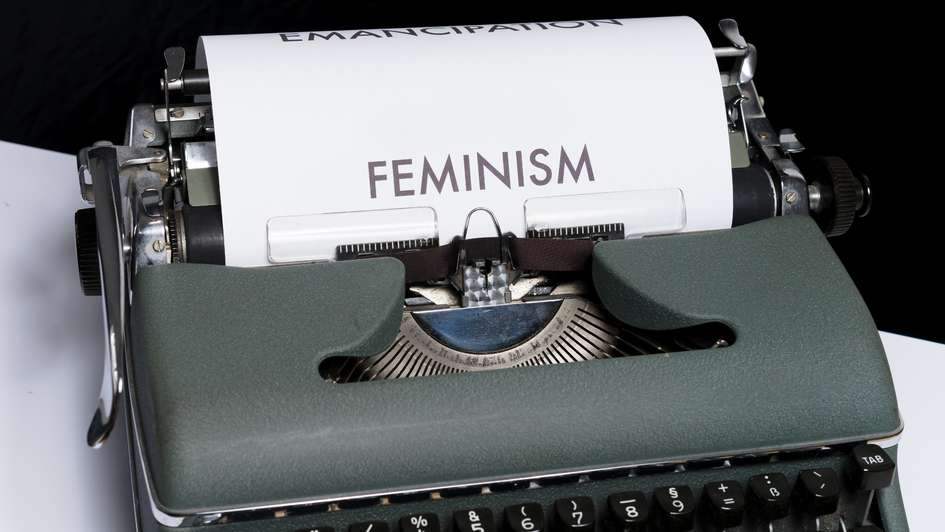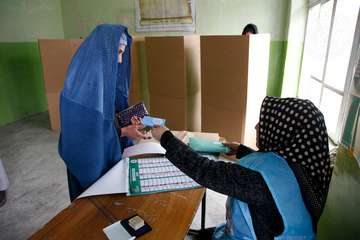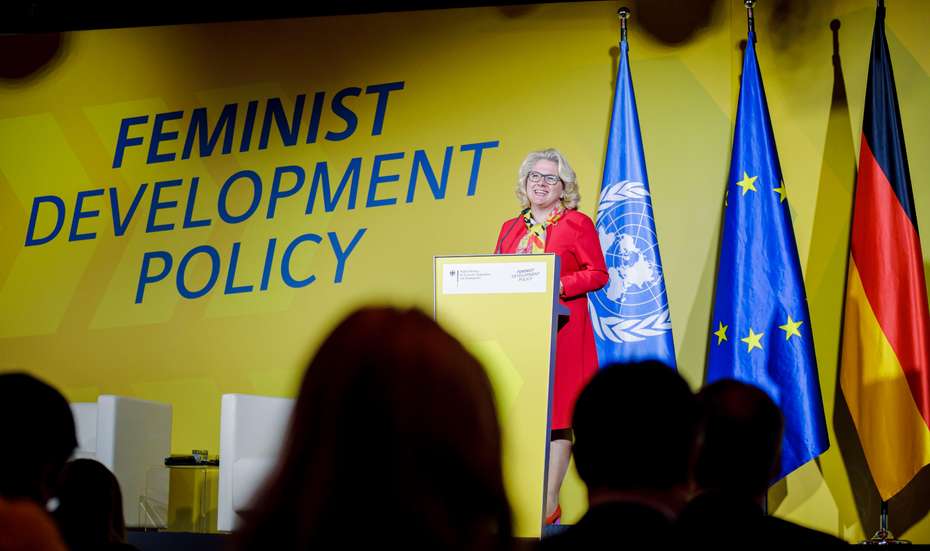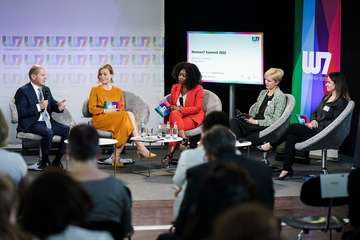The Ambivalence of Feminist Development Policy
Global asymmetries in trade, finance or (agro-)industrial policy cannot be addressed through refurbished programs for women’s rights and equality.

And so, with a bit of a time-lag following foreign policy, German development policy is becoming visibly feminist.
“And what exactly does that mean?”, “What is the difference to Gender Mainstreaming in development policy?”, “Does that not mean that a decade-long history of feminism and development is simply reduced to promoting equality?”
These are some of the questions being raised by sceptics in academic and critical development-NGO circles (ref. Khaled-Ibrahim/Schaefer 2022) after development minister Svenja Schulze came forward with her proposals on feminist development policy in autumn 2022.
“If this label helps us to overcome years of gender fatigue in development cooperation and give new impetus to promoting women and gender policy – which feminist should be against it?”: This is the pragmatic position which is widespread in the major organisation that implement development policy.
There is no doubt that both positions have their legitimacy. Both have their roots in a history of more than 50 years of transnational work on feminism and development – and both point to numerous inconsistencies and question marks which are raised in the spectrum between rejection and acceptance of the new claims of feminism in development policy.
A look back
Almost 50 years ago the UN, responding to pressure from women’s groups in the South and the North, declared 1975 International Women’s Year and the time between 1976 and 1985 the United Nations Decade for Women. Three World Conferences on Women were held in those ten years, which led to numerous processes of joint organisation and communication between women’s movements around the world. In contrast to all the talk of almost natural global solidarity among women, in the beginning there were intense conflicts and manifold controversies between feminists of diverse origins and political backgrounds which focused on all the subjects of conflict in global politics that divided them: exploitative structures of the international division of labour; tensions between centre and periphery as well as racist structures of dominance between North and South; antagonism between East and West as well as the various policies of war of the time.
As a result, feminist movements early on proved to be forums for radical systemic critique which never saw justice in global structures as an exclusive function of gender relations. Instead, they always debated inclusive perspectives on equality which took account of diverse forms of oppression and exclusion. In extensive and exhausting disputes they tested a sustainable practice of political solidarity across divisive trenches of race, class and geopolitics which in the end cleared the way so that the Fourth World Conference on Women in 1995 could look for pragmatic cooperation and agree at this conference of states on the Beijing Platform for Action (ref. UN Women).
Women’s human rights and gender mainstreaming were confirmed as the basis of gender justice in global development and equal rights at least theoretically became the overarching goal of all international development programmes and measures. Transnational feminist movements had become decisive actors in the transformation of international policy.
Feminist Foreign Policy
That feminist development policy should eventually become a priority for the BMZ (Federal Ministry of Economic Cooperation and Development – Bundesministerium für wirtschaftliche Zusammenarbeit und Entwicklung) almost 50 years after 1975 and more than 25 years after Beijing is not only a result of the continuation of feminist battles for gender justice in development (which since the last World Conference of Women have become less vocal and more decentralised). It was the agreement on a “Feminist Foreign Policy” in the 2021 Agreement of the governing coalition between Social Democrats, environmentalist Greens and market liberal Free Democrats which led to the foreign minister bringing feminist policy goals into public debate – in the context of the Russian war against Ukraine.
The so-called 3R-policy aims to give stronger emphasis to the (human) rights of women, to (political) representation of women (and “women’s interests”) and to providing resources for gender equality in both foreign and development policy. This is all the more urgent in the context of the war in which patterns of paternalistic violence as well as traditional gender roles are being sharply accentuated. (Mostly) men are fighting in the war, (mostly) women are fleeing and taking children to safety, traditional gender stereotypes and the concomitant forms of inequality and violence are experiencing a broad political and societal revival. On the other hand, the idea of equality based on the 3R principles is far from sufficient in finding an effective answer to even the harshest (mildest???) effects of the violence of war.
And this approach is even less successful in meeting the demands of critical feminism in foreign and development policy (ref. WILPF 2022). Well beyond questions of representation and access to resources these stress the necessity – especially in situations of conflict and times of war – to think and act “in the logic of peace” (Birckenbach 2023), that is, to curb violence, promote societal cooperation and counter all forms of populist-nationalistic polarisation.
Contradictions
The strong tension visible in the debate on feminist foreign policy between vision and possible implementation of 3R-equality (ref. Ruppert 2022) applies to feminist development policy in reduced form. While foreign policy pursues above all “hard” (economic and security) interests and comprises societal debate at best marginally, development policy is the area where “hard” and “soft” policy dimensions are combined. Here, apart from interest-based policies, societal debates about “good” norms and the conditions for the implementation of global development are also discussed.
Contradictions between human rights goals and political reality, between “good” norms and problematic consequences are in effect everyday matters in development policy. The tension between the implementation of hard interest by means of development policy and the societal battles for a “good life” for – hopefully – all people in all parts of the world may be immense. But these contradictions have for decades been driving the conceptual “development of development policy”.
The context of development policy itself creates a space in which intensive debate about the im/possibilities of such policy takes place. As a result, the discourse about development with its varying political currencies, its embattled international institutions and its political events such as world conferences and development summits has since the 1970-ies been one of the major junctions for feminist debate about the goals of global development. The fact that the BMZ is promoting this perspective of critique to the level of a policy programme is not only a response to the dynamics of coalition politics and political strategy but is also an achievement of decades of feminist intervention.
“Feminist development policy keeps all people in focus and addresses the roots of injustice: gender power relations, social norms and role models”, states the BMZ-website on feminist development policy. At first glance, such a mission statement in uncontroversial. We need to wait and see, however, whether the BMZ is looking only at the immediately visible surface of gender relations or whether its gaze reaches down to the underlying politico-economic foundations of gender-based power relations. If the latter were the case, this would mean addressing the causes of poverty (of women), inequality and oppression (of women) which lie in the “imperial way of living” (Brand/Wissen 2017) of the privileged in the global North, which for centuries has been at the cost of the marginalised of the global South – with all its foundations in economic and financial policy.
The BMZ wants to include a feminist perspective in all aspects of future development work, expressly including economic and political questions. In the medium term, it remains to be seen to what extent these priorities will exhaust themselves in conventional components of equality policy being appended to development projects. Or whether they will be included in treaties and agreements in order to achieve more fundamental goals beyond giving women better access to labour markets or credits.
“To overcome asymmetries, for instance in trade and agricultural policy or through rules for development focused fair migration” (BMZ 2023:7), as the BMZ states in its new Africa policy, would certainly be in accord with a feminist development policy – and, considered from a radically feminist perspective, would have far reaching consequence. From a feminist perspective, socially sustainable conditions of nature and appropriate means of production, social security, human rights and equality have absolute priority over growth, new export opportunities and foreign currency earnings which in fact, in terms of overcoming asymmetrical global structures, would need to be reduced rather than expanded. Or as the German section of the NGO Women’s International League for Peace and Freedom (WILPF) states in its policy brief on feminist foreign policy: “Trade agreements need to focus on social reproduction and replace purely commercial profit targets with systems of assessment and rating which regard human rights and the rights of women as economic success” (WILPF 2022:15).
Developmental Practice
The more concrete they become, the more the positions of the BMZ on feminist development policy sound like a conventional programme to strengthen women’s rights. There follows a well-known catalogue of gender mainstreaming, which includes above all the promotion of equality through legislation, education, health care, improved participation and awareness campaigns. Also familiar from mainstreaming is the focus on combatting violence against women and girls.
Beyond that, the new development policy wants to add more weight to intersectionality and work on the specific interaction of various forms of discrimination and societal exclusion. Currently, there is a focus here on long overdue respect for the human rights of queer people in development policy as stated in the inclusion guidelines of the foreign ministry and BMZ of 2021 (ref. Ruppert / Schnauder 2022). A second aspect of intersectionality is an increased awareness of the coloniality of development policy and the resulting racist structures of power and authority. However, a framework for dealing with post- and neo-colonial constellations and dilemmas in development policy beyond rhetorical commitments to partnership and mindfulness in discourse remains a question treated in theory (ref. Ndlovu-Gatsheni 2020) rather than one answered in developmental practice.
It is indisputable that gender measures can play a significant role in processes of societal debate about gender equality – provided they are well embedded in society, well considered and implemented with sufficient intensity and quality. So far, however, the gender budget of German development policy offers little realistic prospect for such concerted activities. According to the assessment of VENRO (German Association of Development Politics and Humanitarian Aid) of feminist development policy (VENRO 2022:3), in the year 2020 about 45 percent of bilateral development cooperation funding went to projects and programmes that listed gender equality as a subsidiary or primary goal. What exactly is to be understood by the phrase “gender equality as a subsidiary goal”, how many “mini components” of projects and what funds are counted here, is hardly transparent. It may sound impressive if the minister now states that this component will be increased to 85 percent by 2025 (BMZ 2022), but this may have little practical effect. On the other hand, according to VENRO, the share of projects that set gender equality as their direct and primary goal in 2020 was “of negligible significance at two percent of sectorally assignable ODA” (qv.). VENRO calls for an increase of these funds to 20 percent. The ministry has confirmed an increase to eight percent.
Ambivalent Outlook
Beyond these budgetary questions, there is no doubt that this refurbished programme of women’s rights will not come close to meeting the far-reaching demands on equality posed by transnational feminist movements. Asymmetric global structures are constantly being reproduced and strengthened by global trade and finance policy, by resource extraction and raw materials policy, by investment and (agro-)industrial policy. They cannot be addressed through policies of gender equality. This does not speak fundamentally against policies of gender equality and the respective plans of the BMZ. Even though equality measures of development cooperation are often instrumentalised to achieve other goals such as promotion of private enterprise or financialization (through credit) (ref. Wichterich 2022), they are irreplaceable as compensatory measures against inequality.
Feminism is much more and more fundamental than the compensation of inequality. However, the is no copyright on the term feminism and in view of the antifeminist movements and tendencies which are getting stronger in many countries, there are more important things to do than to have an all too intensive debate about the use or misuse of this term. Nevertheless, in times of the escalating multiple crises of the global capitalist system, there is at the least a certain ambivalence in speaking of “feminist development policy” and thereby claiming a conceptual closeness to the worldwide feminist movements which have for decades been among the most significant forces in the transformation of injustice and inequality. Over the decades, development policy has contributed to opening space for discussion about the feminist goals of global development. With the institutional takeover of a feminist perspective there is the threat of a narrowing if not closing of this space which in the medium term would not even serve the interests of equality of the institution itself. The basic contradiction of development policy being part of the problem which it is working to solve will certainly not be overcome by simply declaring development policy to be feminist.



